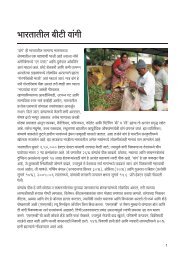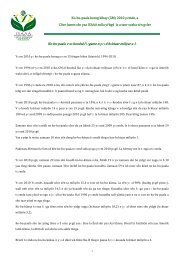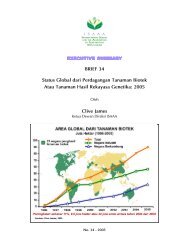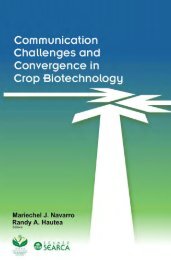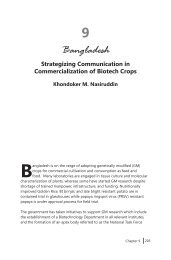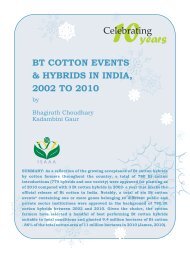Information Tug-of-War: Saga of Biotech Papaya 7 Agricultural - isaaa
Information Tug-of-War: Saga of Biotech Papaya 7 Agricultural - isaaa
Information Tug-of-War: Saga of Biotech Papaya 7 Agricultural - isaaa
Create successful ePaper yourself
Turn your PDF publications into a flip-book with our unique Google optimized e-Paper software.
<strong>Information</strong> <strong>Tug</strong>-<strong>of</strong>-<strong>War</strong>: <strong>Saga</strong> <strong>of</strong> <strong>Biotech</strong> <strong>Papaya</strong><br />
Similarly, BBIC, BAA, and BIOTEC realize the need to strengthen the farmers’<br />
voice. District <strong>of</strong>ficers or village leaders are influential as they are sought in<br />
local consultations about various grassroots’ issues. The decentralization <strong>of</strong><br />
power in Thailand puts the spotlight on these district <strong>of</strong>ficers as local activities<br />
such as construction and setting up <strong>of</strong> factories, for example, require their<br />
participation and approval. An informal group <strong>of</strong> farmers planting papaya,<br />
rice, sugarcane, and maize, known as “Farmers Club” is being formed. Some<br />
<strong>of</strong> the farmers from four provinces have attended an exchange program<br />
to visit biotech maize fields in the Philippines and to see biotech papaya in<br />
Hawaii. They will file a petition with the National Human Rights Commission<br />
to ask that they be given the right to use the technology, and to have access<br />
to new methods to help them solve agricultural production problems (S.<br />
Sriwatanapongse and B. Nathwong, personal communication).<br />
Civil Society Groups<br />
Prime Minister Thaksin’s reversal <strong>of</strong> the ban on GM field trials in 2004 was<br />
met with opposition by various groups. GRAIN & BIOTHAI (2005) enumerated<br />
these groups to include farmer groups, NGOs, Buddhist communities, and<br />
Thai organic business groups. Of the NGOs, Greenpeace Southeast Asia<br />
played a very influential role with environment group BIOTHAI and the<br />
Assembly <strong>of</strong> the Poor taking a critical but less aggressive stance. BIOTHAI<br />
which represents the Biodiversity Action Thailand, formerly the Thai<br />
Network on Community Rights and Biodiversity, was established in 1995.<br />
Initially, it took on issues on biodiversity, trade-related intellectual property<br />
rights, and protection <strong>of</strong> local knowledge systems. From 1997 to 1999, it<br />
campaigned about concerns related to health and safety <strong>of</strong> GM crops and<br />
food. In 2000, BIOTHAI launched a ten-day mobile campaign to inform the<br />
public about the threats <strong>of</strong> GMOs. The caravan-type campaign traversed six<br />
provinces including Bangkok particularly in places where farmers and local<br />
organizations were initiating activities related to the technology. BIOTHAI<br />
asked countries like Thailand to “define their options and set directions for<br />
agricultural research and development that are most appropriate to the<br />
people.” The group noted uncertainties about the technology, lack <strong>of</strong> public<br />
participation in its introduction, and weak regulatory systems. BIOTHAI is a<br />
member <strong>of</strong> several national policy bodies as an NGO representative and has<br />
joined other Southeast Asian NGOs (BIOTHAI, 2000).<br />
Chapter 7 171



